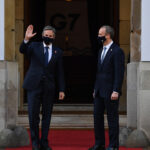Edgar Snow’s Red Star Over China triggered a China craze in Europe and the United States. Many Western journalists dreamed about going to China, a country under “red star”. Harrison Forman, an American explorer, photographer and war correspondent, was one of them. After his many visits to China, he penned the book Report from Red China, which is often seen as a companion piece to Red Star Over China. In his book, Forman provided a factual account of the Chinese people’s war of resistance against Japanese aggression.
In 1937, on the eve of the July 7th Incident, Forman came to the Soviet Area in northern Shaanxi for the first time to interview the Red Army, which was preparing to march to the front line to fight against Japanese aggression. After his meetings with Peng Dehuai, He Long and other Red Army generals, Forman expressed his appreciation for the Communist Party of China (CPC)’s policy of cooperation with the Kuomintang (KMT) and the establishment of a national united front against Japanese aggression. He was also full of admiration for the people’s anti-Japanese armed forces led by the CPC. A red seed was quietly planted in his heart.
In 1940, Forman came back to China as a correspondent of The New York Times, The Times and BBC. As a veteran journalist, simply listening to air-raid sirens and writing superficial reports in Chongqing were not enough for Forman. Driven by his journalistic ethics, Forman was eager to go to Yan’an, which was under military blockade, and to find answers to the many baffling questions that had been lingering on his mind: What was it like in the blocked area? Was it true that the CPC was, as the KMT government portrayed, treacherous and refused to resist Japanese aggression? How did the CPC survive the blockade of both the Japanese and KMT armies? Forman couldn’t wait to find out the truth and report it to the world.
In May 1943, Forman and a number of foreign journalists in Chongqing presented a petition to the KMT authority, asking to go to Yan’an, but their request was denied. Despite all the difficulties, Forman did not change his mind to seek the truth. In May 1944, Forman and 20 other Chinese and foreign journalists finally made their way into the Shaanxi-Gansu-Ningxia Border Region, setting foot on the land of “Red China”. Here, Forman realized that Chinese Communists had created a miracle in China, that is, they had won the respect and cooperation of the people.
During his visit, Forman observed close-up how the Eighth Route Army fought and lived. After spending five months with Chinese Communists, Forman was convinced that the CPC leadership had the support of the people. He reached that conclusion based on his observation of the militia fighters. He said that the 2.2 million militia fighters were the backbone of the war against Japanese aggression in northern and central China. They received arms from the CPC. From what he saw, the attitude of the militia gave the most clear answer to his question of what the people thought about the CPC: an armed people would not tolerate an unpopular government and an imposed army for long. This was a universal truth. Forman was also surprised to find that the army led by the CPC was not only brave and fierce in battles, but also took part in the production activities in the area, forging a close bond with the local people. Touching scenes like women bringing drinking water to Eighth Route Army soldiers and villagers volunteering to carry the wounded from the front line to hospitals all left a deep impression on him.
During the visit, Foreman also talked to captured Japanese soldiers. He found that compared to Eighth Route Army soldiers, Japanese soldiers were provided with better food, more meat and plenty of daily necessities. With the CPC’s persuasion and the active efforts of Japanese Communists, some Japanese soldiers and prisoners left the Japanese army and established the Japanese People’s Emancipation League. It was the political guidance and lenient policies of the CPC and the Eighth Route Army that turned some “Japanese aggressors” into “Japanese soldiers of the Eighth Route Army”. Forman even heard some Japanese shouting out loud in Yan’an that they were ready to fight the Japanese militarism with America and other allies at any time. Everything he saw reaffirmed his belief that the Chinese people’s fight for national liberation would get the support of people all around the world that had a sense of justice, and that the Chinese people would win the final victory.
Forman made an impassioned speech in Yan’an. He said, “As a journalist, it is my job to find out the truth…We were told that the Eighth Route Army did not fight…that the people feared and hated the Eighth Route Army…Today, these lies have all been exposed by facts. I have seen the Eighth Route Army soldiers fighting a heroic battle…and that they are loved by the people…By my writings and photos, I will tell the world the heroic deeds of the Eighth Route Army that I saw.”
In 1945, Forman returned to the United States and published the book Report from Red China, presenting the real Yan’an to the world with a detailed account of Forman’s interactions with Chinese Communists. Like Edgar Snow’s Red Star Over China, the book triggered the most extensive coverage in Western media on the CPC and the people’s government under its leadership. In a time of rampant lies, the publication of Report from Red China proved to the world that no military or media blockade could wear down the will of Eighth Route Army soldiers, or weaken the CPC’s influence.
Report from Red China


